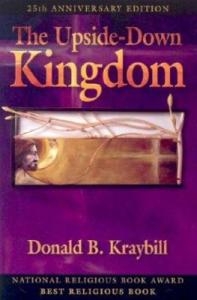The Upside-Down Kingdom, Chapter 4: Free Slaves
Here I continue discussion of Donald Kraybill’s classic book on Christian ethics. According to Kraybill in this chapter, Jesus announced and inaugurated a new social order based on the principles of God’s “jubilee” commands to Israel. The chapter contains a fine, concise description of that and then brings forth the principles that undergird it and are trans-cultural. They imply, for God’s people, forgiveness and deliverance—including forgiveness of debts and deliverance from poverty.
What I want to do now is bring forth what I think Kraybill’s chapter IMPLIES for us, God’s people, today, and that is redistribution of wealth as a sign of Kingdom of God living. Allow me license to jump to an extreme conclusion and back up from there: Among Christians there should be no billionaires. There, I said it. Have at it if you wish (but peacefully).
Well, okay, but what else? How do we get into the weeds, so to speak? As always, the devil is in the details. Ought Christians to enforce the economics of jubilee on everyone, on society? Remember that Israel was a theocracy even if it didn’t always live as one. Remember that we are not a theocracy and don’t want to be. (Well, most of us don’t want to be before Jesus returns.) Nowhere did Jesus instruct his disciples to become politically active to form a new theocracy by force or any means other than, perhaps, persuasion.
So how do we apply Jesus’s economic vision to today? Kraybill well says that we should focus on the underlying principles, not the mechanics. I will dare to say something he doesn’t, even though I think he would agree. An implied principle of Jesus’s messianic announcement in his hometown, at the beginning of his ministry, is God’s preferential option for the poor and what ought to be the churches’ preferential option for the poor.
In Latin America, during the 1960s through the 1990s (and beyond) the mostly Catholic liberation theologians MOSTLY did NOT advocate revolution or seek worldly power. (There were some exceptions such as the three Catholic priests who entered the Sandinista government after the civil war that ousted the dictator Somoza.) I read, studied, taught and met the best-known and most influential of all the liberation theologians—Gustavo Gutierrez. Nowhere did I read or hear him advocate a forceful revolution to impose a specifically Christian economic ideology or system (or any other). Rather, like most of the Latin American liberation theologians, he spoke and wrote prophetically TO the powers that be, including the politically powerful Catholic hierarchy. He/they did not try to form a political party to impose Christian principles. What they wanted was for the church to adopt Christian principles including economic ones, including redistribution of wealth based on God’s preferential option for the poor. Then, the church would use its influence to turn the world upside down.
(I know very well that some Latin American liberation theologians supported revolutionaries but only because revolutions were already happening. Just as many colonial, early American ministers supported the American War of Independence once it started.)
Insofar as and if Christians adopt Jesus’s principles for God’s upside-down kingdom, what should we do politically? First, we should adopt them within the churches. Second, we should show the world how blessed we are as we live according to God’s upside-down kingdom principles and allow God to work in the world’s hearts and minds. Third, we should vocally support Christian and non-Christian political leaders who advocate for and intend to implement upside-down kingdom principles and we should prophetically criticize those who are motivated by, for example, Social Darwinism, even if they are so-called “evangelical Christians.”
*Note: If you choose to comment, make sure your comment is relatively brief (no more than 100 words), on topic, addressed to me, civil and respectful (not hostile or argumentative), and devoid of pictures of links.*














